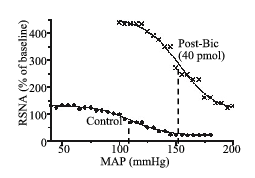
The dorsomedial hypothalamic nucleus (DMH) plays a critical role in mediating the increase in arterial pressure and heart rate evoked by an acute stress (Stotz-Potter, et al., 1996). The cardiovascular changes evoked by acute stress are also associated with modulation of the baroreceptor reflex (Spyer, 1994). The aim of this study was to determine if the DMH is capable of modifying the baroreceptor reflex control of heart rate and sympathetic vasomotor activity.
Experiments were performed on rats anaesthetised with urethane (1.35g/kg i.p.). Arterial pressure, heart rate (HR) and renal sympathetic nerve activity (RSNA) were measured. The baroreceptor reflex function was determined by measuring the changes evoked in HR and RSNA by alterations in mean arterial pressure (MAP) over a wide range (50-200 mmHg), induced by intravenous infusions of a vasodilator (sodium nitroprusside) or vasoconstrictor (phenylephrine). In each experiment, baroreceptor reflex function curves were determined before and after microinjection of the GABA receptor antagonist bicuculline (4 or 40 pmol) or the vehicle solution of artificial cerebrospinal fluid (ACSF) into the DMH. A logistic function curve of best fit was calculated in each case.

As illustrated in the Figure, disinhibition of DMH neurons by bicuculline microinjection resulted in a shift in the baroreceptor reflex function curve. The baroreceptor reflex operating point (OP, dashed line) for the baroreflex control of both HR and RSNA was significantly increased (*P <0.05) in a dose-dependent fashion by bicuculline microinjection, but not ACSF microinjection into the DMH (see the Table below). There was no reduction, however, in the gain of the renal sympathetic or cardiac component of the baroreceptor reflex.
| ΔOP (mm Hg) | |||
| Bic (pmol) | n | HR | RSNA |
| 0 (ACSF) | 6 | 0±2.6 | 3±1.9 |
| 4 | 6 | 15±4.1* | 9±2.4* |
| 40 | 6 | 26±4.1* | 18±5.7* |
We conclude that activation of the DMH alters the operating point of the baroreceptor reflex, but that the reflex remains operational over a wide range of arterial pressures.
Spyer, K.M. (1994) Journal of Physiology, 474, 1-19.
Stotz-Potter, E.H., Willis, L.R. & DiMicco, J.A. (1996) Journal of Neuroscience, 16, 1173-1179.